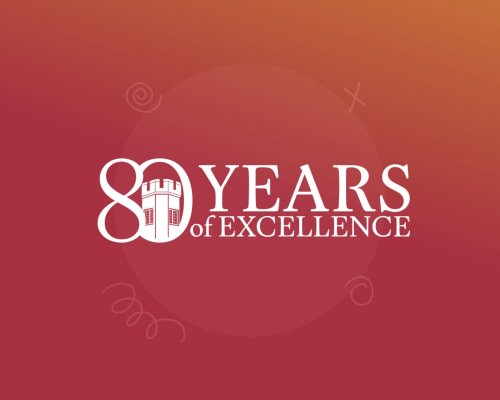
Blair Mersinger Pasalic '02 was recently awarded the Arthur Flemming Award, which honors outstanding federal employees. She was nominated by her employers at the U.S. Department of Energy for her work related to Ukraine.
Leadership in a Time of Challenge: How We Helped Keep the Lights on in Ukraine
Written by Blair Mersinger Pasalic `02
A few months ago, I was sitting at my desk, wrestling with the formatting of a budget spreadsheet, when my office phone rang. Expecting what most of us expect when a landline rings these days (spam!), I picked it up with the flattest, most reluctant voice I could muster.
“Hello?”
“Hello,” said the voice. “I am calling from the National Academy of Public Administration and I wanted to let you know that you have won the 2023 Arthur Flemming Award for Leadership and Management.”
“Sorry, I’m not interested,” I sighed, pulling the phone away from my ear.
“No! I’m serious! Please! We’re real! Look us up on the internet right now.”
To my total surprise, the call was real. I had won an Arthur Flemming Award for Leadership and Management. After a profuse apology and a note of gratitude, I hung up and realized I had no idea what an Arthur Flemming Award was. I minimized my Excel spreadsheet and opened up Google.
Turns out, it was a bigger deal than I would have thought. Started by former U.S. Secretary of Health, Education, and Welfare Arthur Flemming, the eponymous award has annually recognized outstanding federal employees in the fields of science, legal achievement, and leadership and management since 1948. Literally out of the blue, I was now lumped in with a shockingly impressive list of former winners, like Neil Armstrong, Elizabeth Dole, and Anthony Fauci. I glanced back at the wonky Excel spreadsheet I had been trying to fix for the last twenty minutes, convinced this whole thing was some sort of mistake. How could they give someone an award who couldn’t even make a functioning pivot table?
After the shock wore off, I reflected on the Ukraine work that the Flemming Award team had cited in the nomination and how it related to leadership and management.
The main part of the award was focused on the work I had done (as part of a much larger team) to provide electrical equipment to Ukraine in the midst of its war with Russia. In October 2022, about eight months after the war had started, Russia began systematically bombing Ukrainian electrical infrastructure in an effort to plunge the country into darkness before winter set in. This didn’t just affect people’s homes; it threatened to affect the functioning of ancillary services like hospitals, sewage systems, etc. In early October, Ukraine’s energy minister asked the U.S. Secretary of Energy for assistance in propping up Ukraine’s power grid, and she turned to our team for help. At the time, I was serving as the Department’s Director of the Office of European and Eurasian Affairs, and our team, together with a much larger group of experts from our Cybersecurity, Energy Security, and Emergency Response office, our national laboratories, the Department of State, the Department of Defense, USAID, Ukraine, and the U.S. private sector, came together to identify, vet, purchase, and ship electrical equipment to Ukraine.
It was not an easy task. Most large pieces of electrical equipment are bespoke items with long lead times for production. The COVID pandemic had backed up supply chains, so the availability of spare parts was limited. Once the Energy Security and private sector teams had identified where available items were located across the country, the national laboratories had to vet the items to see if they would work in Ukraine’s system. Once that had been accomplished, we had to collectively figure out the best procurement strategies for buying the pieces and then take on the even more onerous task of figuring out how to ship the tractor-trailer sized items across an ocean to a country at war. And all before winter set in in December.
The amazing thing was, we did it. A team of literally hundreds of people worked together and sent the first shipment of equipment to Ukraine by December 15 – within two months of Ukraine’s request for help. We were not an assistance agency; we were not in the business of procuring electrical equipment on the regular, and we certainly hadn’t been able to travel to Ukraine as part of the effort. So how had we done it?
In short, we did it through good leadership at all levels of our organization, and I believe it is leadership that is the key to achieving any seemingly insurmountable effort.
The first example came from the Department of Energy’s top brass, who gave us a daunting but achievable task. Finding electrical equipment to help Ukraine on two months’ notice was an invitation to think big in every way. We had to temporarily and informally redefine our job descriptions, recruit the right experts to help us, and identify new ways of getting things done. The trust that the Department’s leadership put in us to figure it out prompted us to, well, figure it out. So we did.
The second example came from the team’s deep well of positive, collaborative relationships, formed long before Russia ever invaded Ukraine. Our Energy Security office already had a direct line of communication with the private sector that allowed the Department to immediately connect with the companies and utilities that would be able to locate or supply the equipment we needed. Our longstanding relationships with the Department’s national laboratory experts meant that we didn’t have to look far to find the right experts to vet the equipment to see if it could work in Ukraine’s system. We had already worked with our procurement teams in the past on much smaller things like subscriptions and minor contractor services – now, we called on them to help us find innovative ways to buy and ship elephant-sized equipment.
The third example came down to motivation, particularly at the individual level. While we all could get behind the altruistic purpose of keeping the lights on for people in Ukraine, the long nights of work, the missed holidays with family and friends, the inter-office moments of disagreement, and the stress of trying to meet a deadline with life-or-death consequences took a toll on all of us. In the hardest moments of our mission, motivation and positive management were intrinsic to finding a way forward. Within our Europe team, the Deputy Director of the office and I worked hard to carve out breathing space for our staff: putting non-urgent tasks on hold to ease the burden; managing workloads so people could still spend their weekends with their families; celebrating the successes and not overreacting to setbacks. We stayed positive, but we also didn’t pretend that every moment was peachy: sometimes, a collective eye roll or general groan of exasperation was honestly what was needed. This was hard, frustrating, time-consuming, occasionally confusing, and stressful. But it was also impactful and important. We laughed together to relieve the stress (even if it was sometimes gallows humor).
In short, this experience of supporting Ukraine reinforced the incredible things that can be done with good management and leadership. And this once-in-a-lifetime chance to be recognized for the work has given me time to reflect on the influences that have brought me to this place in my career.
I am grateful to Maryvale for its early influences in developing my leadership and management capabilities, which I believe are not intrinsic to any person, but are learned and fostered over time. Being part of the drama and choral programs at Maryvale, for example, put me at ease speaking in front of a big crowd; challenged me to think how words can be used to inform, influence, and entertain; and showed me that the success of a large production is dependent on a large team of motivated individuals working together. It also provided me with role models of all ages and backgrounds that I could emulate (thanks, Chris Enoch '99 and Elizabeth Nagle '06), peers I could collaborate with, and younger people I could mentor. I further benefited from Maryvale’s class sizes and individual attention, which allowed my interests and passions to be fostered. And lastly, perhaps most importantly, Maryvale’s emphasis on compassion and service did, and continues to, shape my worldview, encouraging me to make personal and professional choices that aim to foster a safer, healthier, and more welcoming world for all.
I’m no Neil Armstrong, that’s for sure. And if I ever successfully make that pivot table in Excel, I guarantee you I still won’t totally understand how I did it, or really what a pivot table is at all. And I doubt I’ll ever feel fully deserving of this Flemming Award given the many hands that went into the success of the Ukraine project.
But then again, I don’t think you have to be a Neil Armstrong or an Excel whiz or a lone operator to make a big impact. I believe that every one of us has the chance to create positive change, whether we are in a formal leadership position or not. I believe leadership starts with a motivation for service, is built on a commitment to collaborative relationships, and blossoms when we choose to think big. All of us can lead if we foster leadership in each other. I am grateful to Maryvale for instilling the roots of leadership in me so many years ago.
Blair graduated from American University’s School of International Service and has worked at the U.S. Department of Energy in various capacities since 2008. She has also worked for the U.S. Department of State and the U.S. Trade and Development Agency. She is inspired every day by her husband of 11 years, Zlatko Pasalic, and her two boys, Felix and Elliot. She is eternally grateful to her parents, Duston and Dolly Wells Mersinger`67, who are hard-working, kind, smart, noble, hilarious, and the best role models she could ever imagine.
























